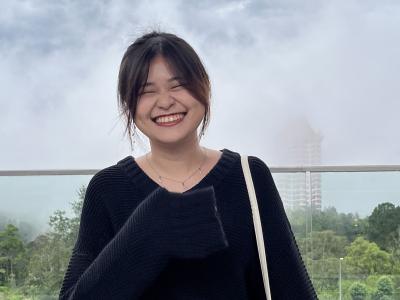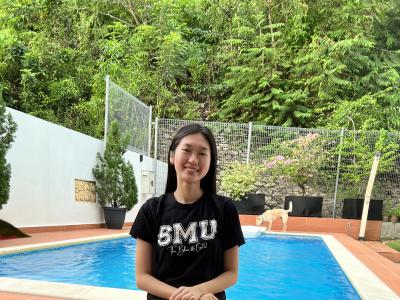
With its rich history, and even richer cultural heritage, Europe is a favoured destination for travellers from all over the world. From cosmopolitan cities to its countless museums and historical sites, SMU students are spoilt for choices when it comes to picking an exchange university in the International Student Exchange Programme (ISEP). Term Two of Academic Year 2021/22 at SMU marked a major milestone, with the first batch of SMU students taking flight since the programme was suspended in 2020. Since then, more than 260 students have attended 57 of SMU’s Partner Universities (PUs) across myriad European cities. We caught up with Kong Pek Yoke, who was in Spain, and Ambrose Wang Xun Jie, who is currently still in Germany (German universities start their Spring term in April) as they give us the low-down on how they went about planning their global exposure experiences.
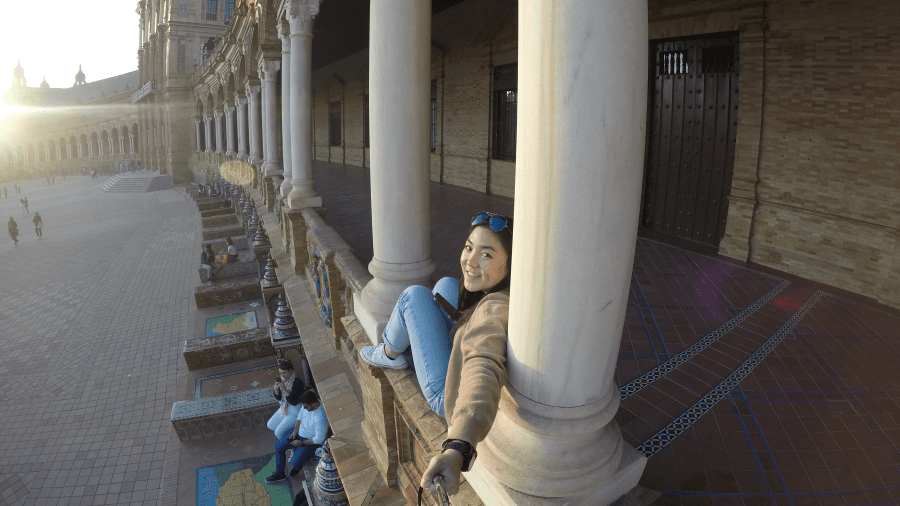
Pek Yoke enjoying the sunset and some alone time at Plaça Espanya in Sevilla, Spain
Kong Pek Yoke, Undergraduate, Yong Pung How School of Law
Host Country: Spain
Host University: Pompeu Fabra University
What motivated you to go overseas for ISEP, despite the persistence of Covid-19 globally?
Exchange was an eye-opening and beneficial opportunity to meet people living completely different lives and who grew up in different cultures and environments. It was also helpful that by the time I applied, more of the world had come to terms with the virus being endemic.
How would you describe travelling overseas again after not having travelled for some 1.5 years?
Although I was quite happy in Singapore when borders were closed, it was still refreshing to be able to go abroad and experience a different culture and way of life. I was particularly struck by the terrain in Spain and how variable it was; the expanse of land and easy access to mountains and nature is not something you can easily get within Singapore.
What were some safe management measures taken at your host university?
My host university required that everyone wore masks indoors. Hybrid lessons were conducted so that students who had caught the Covid infection could still attend class.
Given the uncertainty, what additional safeguards did you take when planning for the trip?
I paid close attention to the local travel restrictions before buying my ticket. I flew with Singapore Airlines, which had helpfully compiled the necessary information and requirements for the country I was travelling to. It was also nice to have the SMU travel insurance, a first step to safeguard students against the unexpected, taken care of for me.
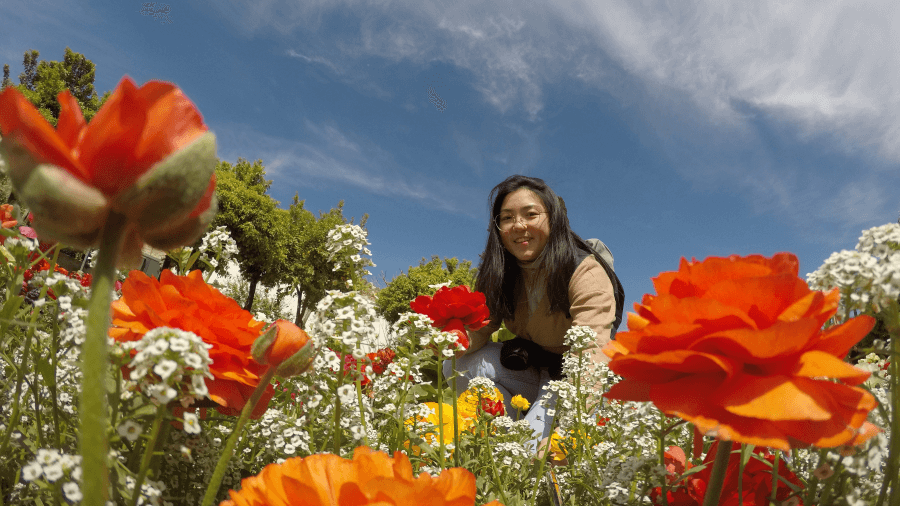
Pek Yoke among a sea of flowers at the Jardins del Alcazar in Sevilla, Spain
Can you share your total expenses for the entire term and some related costs?
In total I budgeted about S$12,000. My accommodation was about S$2,000 per month. I had to pay more for accommodation as I stayed for a relatively short three months (my host university runs on a trimester system) and hence, could not benefit from long-term rental rates. The cost of living in Barcelona is reasonable, and groceries and daily necessities like toiletries were actually cheaper than in Singapore. However, a meal outside costs 15-20 euros, so I cooked my own meals more often than I did in Singapore. I would estimate that I spent about 150 euros on food per week. I had also bought two one-way tickets to Spain and back for about S$700 each.
Any money-saving tips for fellow SMU students who aspire to go for ISEP?
Don’t plan the ISEP like you would plan a holiday, as your budget has to stretch for a few months instead of just a couple of days or weeks! You can also book accommodations early for better rates, and I have heard that some hostels in Spain organise free tours for the students staying there, so that’s something worth checking out.
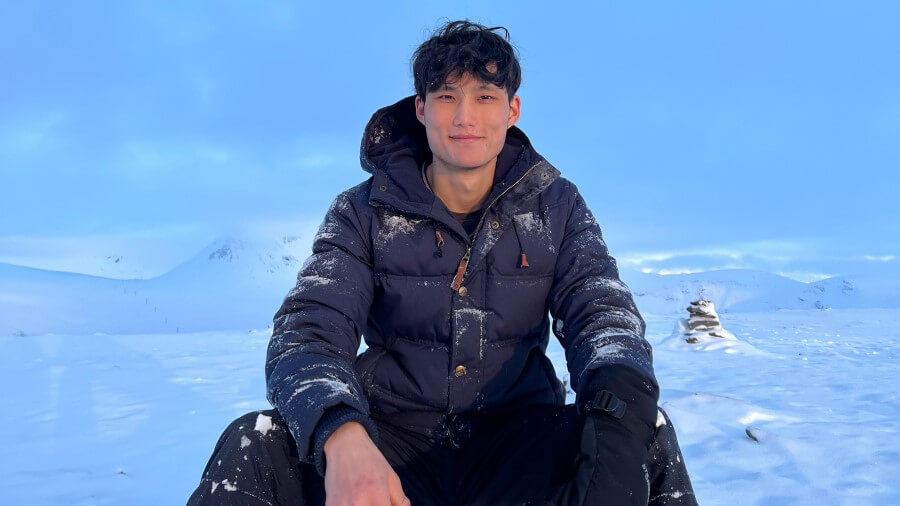
Ambrose conquering the summit of Fjellstua in Tromsø, Norway
Ambrose Wang Xun Jie, undergraduate, School of Computing and Information Systems
Host Country: Germany
Host University: Ludwig Maximilian University of Munich
What motivated you to go overseas for ISEP, despite the persistence of Covid-19 globally?
I proceeded with ISEP as part of accepting the risk of and living with Covid-19.
How would you describe traveling overseas again after not having travelled for some 1.5 years?
Having the liberty to explore a larger and different country from Singapore was a much-needed boost to my mental well-being.
What are some safe management measures taken at your host university?
At the moment masks are required to be worn on campus, though measures are being rolled back over time. Masks aren’t required in most other places except public transport, and life is almost back to the way it was.
Given the uncertainty, what additional safeguards have you taken when planning for the trip?
As my exchange started later, I made most of my key purchases only in 2022, when the situation was already more stable in most parts of the world.

Sunset at the summit of Fjellstua in Tromsø, Norway
Can you share your total budget for the entire term and other related costs?
I’ve budgeted about S$10,000, including S$900 for return air tickets, for this trip. I’ve also set aside some buffer funds in case of emergencies, or if I decide to travel more within Europe at the end of my exchange. Renting privately in Munich is incredibly expensive compared to getting student accommodations via the Student Union (800+ euros per month to rent privately vs. 350 euros to rent through the union). Eating out in Germany is also costly compared to Singapore (about three times greater on average) so cooking is the default here on most days.
Any money-saving tips for fellow SMU students who aspire to go for ISEP?
Cooking at home is essential – so try to get used to eating local staples like pasta, bread and potatoes. If you want to travel within Europe, Eastern Europe is fantastic on a budget while Nordic countries would be more expensive.
Interested to embark on ISEP? With partner universities in more than 150 cities across 45 countries, there are diverse destinations for different budgets. You may also find more information on awards, grants and scholarships to support you on your academic endeavours abroad here. Matriculate today! Our matriculation window closes 30 June 22.
Effective from 17 March 2022, the newly formed Academic Services and Operations Office had taken over the management of ISEP from the International Office. In line with the lifting of the University’s suspension on SMU-sanctioned travel, we have resumed in-person formats for our global exposure programmes in a safe manner, with the health and safety of students as priority. There are additional measures taken to enable students to navigate the new normal of international travel. As always, we thank everyone for their patience, understanding and support as we ride out these challenging times together.
